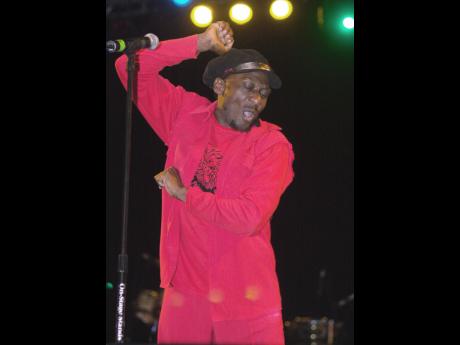Vere Johns unearthed musical talents, helped shape J'can music
Whenever recommendations are made concerning the choice of additional national heroes or heroines, little or no mention is made of Vere Johns. Yet, the records are there to show that Johns has done just as much, and in some instances, more, than, many others, to satisfy the criteria of what is required to become a national hero.
As we exit Jamaica's 55th Independence anniversary celebrations, we recall the numerous musical talents that emerged at the birth of the nation - talents whose music not only complemented and created the spice for that inaugural celebration, but which laid the foundation on which the all-important reggae music was built.
Lest we forget, or lest we didn't know, Vere Johns was responsible for unearthing some 90 per cent of these talents through his 'Vere Johns Opportunity Hour' talent shows, which he single-handedly funded out of his own pocket. In helping to further launch their careers, Johns would expose the winners on his radio show 'Opportunity Knocks' on Radio Jamaica. He went further by paying the travelling expenses for several aspirants to 'greener pastures' to improve themselves. Were it not for Johns' work, perhaps many would have fallen by the wayside or ended up in other occupations since there were very few other avenues for artistes to get into the recording studios. Can you imagine what Jamaica's reggae music would look like today?
The story comes to life even more vividly when one views the unending role call of Johns-produced music aspirants who went on to place Jamaica on the international music map. Check the list for yourself: Bob Marley, Jimmy Cliff, Hortense Ellis, Alton Ellis, John Holt, Millie Small, Derrick Harriott, Derrick Morgan, The Blues Busters, Higgs and Wilson, Lascelles Perkins, Bunny and Skully, Laurel Aitken, Wilfred 'Jackie' Edwards, Jimmy Tucker, Girl Satchmo, Lloyd Clarke, Alan Magnus, Adina Edwards; musicians Roy Richards, Charlie Organaire, Rico Rodriguez, and others. They came in droves - hopefuls, actors, dancers, tricksters, singers - all kneeling at his feet, seeking an opportunity to become popular entertainers. They all saw him as the man who held the key to the door of success.
Carnival atmosphere
The East Queen Street-based Palace Theatre, the Spanish Town Road-based Majestic, and The Ambassador in Trench Town were the venues most commonly used by Johns to host his shows. The events took on a carnival atmosphere and almost invariably reached fever-pitch levels with the full involvement of audiences that became decision-makers by their reaction.
With the competition being fierce and intense, the shows were not without drama. According to Colby Graham, author of The Vintage Boss magazine, "Coins were oftentimes thrown on stage by members of the audience to register their approval of a solid performance." The practice was, however, denounced by Johns, who saw it as a dangerous move that sometimes had performers 'ducking' for cover.
In another sense, Johns' talent shows were more like an audition session for record producers who were searching for talent to record. Many successful Jamaican artistes were drawn into recording studios via this route, and this, in a nutshell, underscores the importance of Vere Johns in Jamaica's music history.
Unlike many other aspirants who ventured into their respective fields for their own personal aggrandisement, Johns was on a mission to help the underprivileged. Writing in his newspaper column of The Star on November 3, 1952, Johns lamented: "There are people with money in this country that would see a man go down into the sewer, or take his life with his own hands, rather than put their hands in their pockets and lend him a helping hand."
But half the story has not yet been told. Johns offered himself for service to his country in World War I, and, after returning as a decorated soldier, he returned to a job he had with the postal service.
A man of the soil, Vere Everette Johns, was born in Mandeville in November of 1893 and attended The Mandeville School before coming to Kingston to live with the great sportsman G.C. Foster.
After his second stint with the postal service, Johns left for the United States in 1929. There, he wrote for several newspapers, vehemently speaking out against injustices meted out to blacks. It drew the ire of opposing groups, including the Ku Klux Klan, precipitating his return to Jamaica in 1939.
He brought with him the Vere Johns Talent Show, which he had started, along with his wife, Lillian, in Savannah, Georgia, two years earlier.
Already a revered journalist, elocutionist, philanthropist, impresario, talent scout, radio personality, and war veteran, Johns added another dimension to these already impressive accolades when he ventured into the world of the movies in 1955, playing a role in the adventure thriller Man Fish, which also featured Eric Coverly, the husband of Louise Bennett. A year later, Johns appeared in a 26-minute documentary - It Can Happen To You.
Vere Johns' contribution, remains unmatched in the history of Jamaica's entertainment business. As far as 'rendering service of a distinguished nature' and 'nation building' is concerned, there may have been very few who came closer than Johns in fulfilling those criteria for being a national hero.




